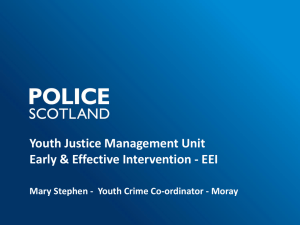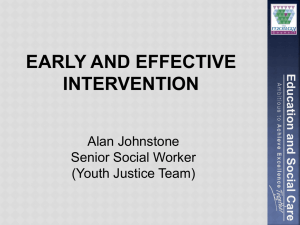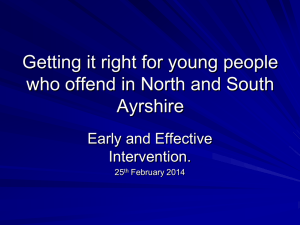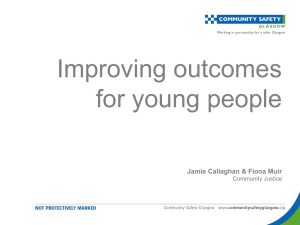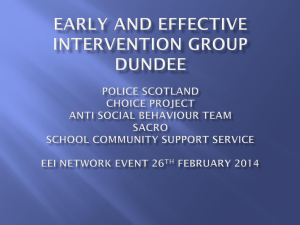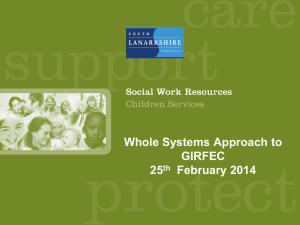info sheet
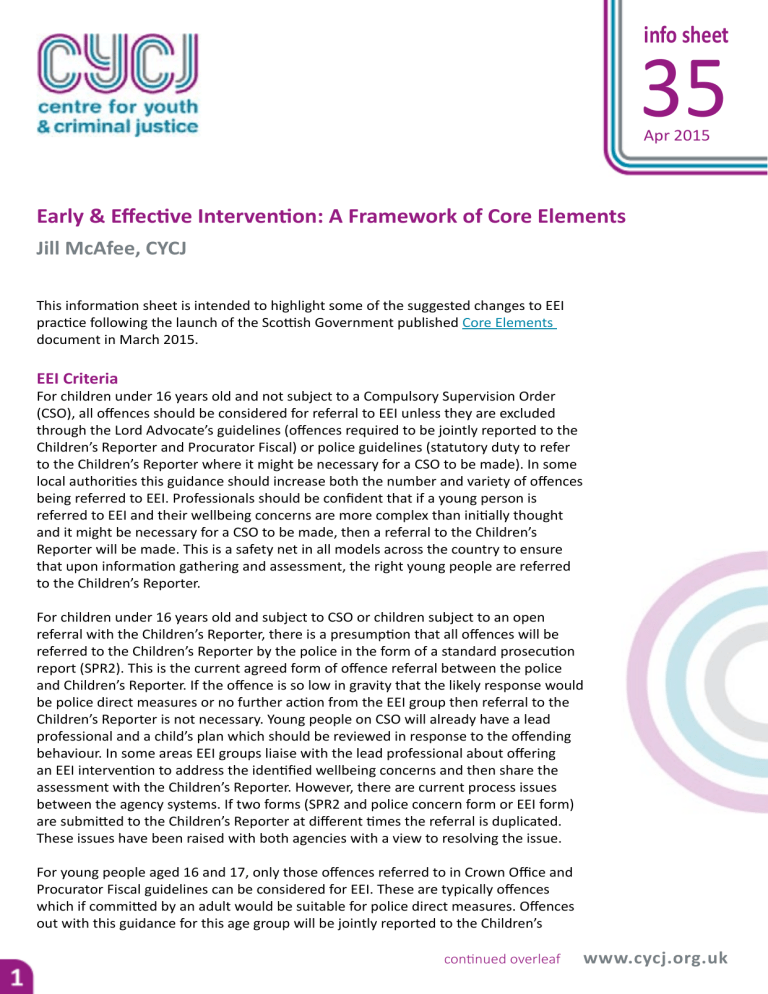
info sheet
35
Apr 2015
Early & Effective Intervention: A Framework of Core Elements
Jill McAfee, CYCJ
This information sheet is intended to highlight some of the suggested changes to EEI practice following the launch of the Scottish Government published Core Elements document in March 2015.
EEI Criteria
For children under 16 years old and not subject to a Compulsory Supervision Order
(CSO), all offences should be considered for referral to EEI unless they are excluded through the Lord Advocate’s guidelines (offences required to be jointly reported to the
Children’s Reporter and Procurator Fiscal) or police guidelines (statutory duty to refer to the Children’s Reporter where it might be necessary for a CSO to be made). In some local authorities this guidance should increase both the number and variety of offences being referred to EEI. Professionals should be confident that if a young person is referred to EEI and their wellbeing concerns are more complex than initially thought and it might be necessary for a CSO to be made, then a referral to the Children’s
Reporter will be made. This is a safety net in all models across the country to ensure that upon information gathering and assessment, the right young people are referred to the Children’s Reporter.
For children under 16 years old and subject to CSO or children subject to an open referral with the Children’s Reporter, there is a presumption that all offences will be referred to the Children’s Reporter by the police in the form of a standard prosecution report (SPR2). This is the current agreed form of offence referral between the police and Children’s Reporter. If the offence is so low in gravity that the likely response would be police direct measures or no further action from the EEI group then referral to the
Children’s Reporter is not necessary. Young people on CSO will already have a lead professional and a child’s plan which should be reviewed in response to the offending behaviour. In some areas EEI groups liaise with the lead professional about offering an EEI intervention to address the identified wellbeing concerns and then share the assessment with the Children’s Reporter. However, there are current process issues between the agency systems. If two forms (SPR2 and police concern form or EEI form) are submitted to the Children’s Reporter at different times the referral is duplicated.
These issues have been raised with both agencies with a view to resolving the issue.
For young people aged 16 and 17, only those offences referred to in Crown Office and
Procurator Fiscal guidelines can be considered for EEI. These are typically offences which if committed by an adult would be suitable for police direct measures. Offences out with this guidance for this age group will be jointly reported to the Children’s continued overleaf
www.cycj.org.uk
Reporter and Procurator Fiscal if the young person is subject to a CSO, and reported only to the Procurator Fiscal if the young person is not on CSO.
Consent and admission of guilt
Consent from the young person and or family is not required for a referral to be made to EEI, this applies to all young people under the age of 18 years. In relation to the
Children and Young People (Scotland) Act 2014, it can be assumed that being charged with a criminal offence will constitute a concern for the young person’s wellbeing and consent is not required from young people to discuss wellbeing concerns with appropriate agencies. Good practice would promote discussing the process and possible outcomes of EEI with the young person and family to encourage their understanding and support of the referral; however, this is different to asking for their consent. Guidance from the Information Commissioner states that consent should only be sought in circumstances where individuals have an actual choice.
Where support or an intervention is offered to a young person in relation to their offending and other wellbeing needs through EEI, the young person has the right to accept the support or not. Engagement is entirely voluntary and it is unacceptable to advise young people that if they do not engage they will be referred to the Children’s
Reporter, this is not the case. Non-engagement should simply indicate supports which have not worked in the past if the young person is referred to EEI in the future.
Similarly, young people should not be referred back to the EEI group for the same offence due to non-engagement.
Denial of the offence should not prevent any young person under the age of 18 being referred to EEI, the criteria is the gravity of the offence. EEI is about support and not punishment and several practitioners have reported that young people who have initially denied the offence to the police have gone on to discuss the circumstances of the offence with a practitioner from social work or another agency. Unfortunately, there are still some practitioners who believe that the young person must admit the offence and show remorse before support out with statutory service should be offered. The framework of core elements does not support this punitive attitude.
There are occasions where young people not only deny the offence but want to prove their innocence and ‘wipe the slate clean’. It is unclear whether the desire to wipe the slate clean is in reference to not being convicted or not having information in relation to the charge being held on police data systems for fear of the impact on disclosure and PVG checks. This is a particularly complex area of work which CYCJ is looking to address in a separate briefing paper. Additional information for practitioners and young people can be found on the Disclosure Scotland website.
Information Leaflets
Practitioners have expressed the desire to have access to national EEI information leaflets to improve consistency when professionals are speaking to young people and their families about EEI. This has been added to the agenda of the next EEI Champions
Group at the end of April 2015.
w e www.cycj.org.uk
cycj@strath.ac.uk
@CYCJScotland
The Centre for Youth & Criminal Justice is funded by the Scottish
Government and hosted by the University of Strathclyde
